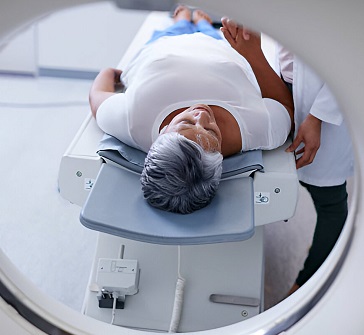 Book Appt.
Book Appt.
 Call Now
Call Now


Introduction
Thyroid cancer starts in your thyroid, a small, butterfly-shaped gland located at the base of your neck. This gland generates hormones that control your metabolism (the way your body uses energy). Thyroid hormones also regulate your body's temperature, blood pressure, and heart rate. Thyroid cancer, a kind of endocrine cancer, is typically quite curable, with a high cure rate.
Thyroid cancer is classified by healthcare providers according to the sort of cells from which it grows. There are four types of thyroid cancer: papillary, follicular, medullary, and anaplastic.
Healthcare providers use a staging method to evaluate whether and how far thyroid cancer has spread. Cancer cells in your thyroid typically metastasise to neighbouring structures and lymph nodes first. Following that, the cancer may spread to distant lymph nodes, organs, or bones. Thyroid cancer stages range from I to IV. Simply put, the greater the number, the further the cancer has spread. Speak with your doctor about cancer staging and how it applies to your specific diagnosis.
Symptoms
Having difficulty breathing or swallowing.
Hoarseness is a form of voice loss.
Swollen lymph nodes in the neck.
Causes
Goiter is an enlarged thyroid.
Family history of thyroid disease or cancer.
Thyroiditis (inflammation of the thyroid gland).
Gene mutations.
Iodine intake is low.
Obesity.
Radiation therapy.
Nuclear weapons.
Diagnosis and Tests
If you have an enlarged thyroid nodule or other indicators of thyroid cancer, your doctor may prescribe one or more of the following tests: blood tests, biopsy, radioiodine scans, or imaging scans.
Treatment
Treatments for thyroid cancer are determined by the size of the tumour and if it has spread. Treatments include:
Surgery is the most often used treatment for thyroid cancer. Depending on the size and location of the tumour, a surgeon may remove part of your thyroid gland (lobectomy) or the entire gland (thyroidectomy). The surgeon will also remove any surrounding lymph nodes where cancer cells have spread.
Radioiodine therapy involves swallowing a pill or drink carrying a larger dose of radioactive iodine than that used in a diagnostic radioiodine scan. The radioiodine shrinks and eliminates both the damaged thyroid gland and cancer cells. This procedure is extremely safe. The majority of the radioiodine is absorbed by your thyroid gland, and the rest of your body is exposed to very little radiation.
Radiation therapy destroys and prevents cancer cells from developing. External radiation therapy employs equipment that delivers powerful beams of energy directly to the tumour site. Internal radiation therapy (brachytherapy) entails implanting radioactive seeds within or around the tumour.
Chemotherapy administered intravenously or orally kills cancer cells and prevents cancer from growing. Few people diagnosed with thyroid cancer will ever require chemotherapy.
The treatment known as hormone therapy prevents the release of hormones that can lead to the spread or recurrence of cancer.
Complications
Thyroid cancer can spread (metastasize) to other parts of your body, such as your liver, lungs, or bones. Detecting and treating thyroid cancer in the early stages reduces your risk for metastasis.
Thyroid cancer can recur even after treatment. Because thyroid cancer grows slowly, it could take up to 20 years to come back. Recurrence happens in up to 30% of thyroid cancer cases.
How does thyroid cancer affect pregnancy?
Thyroid cancer is the second most prevalent cancer detected in pregnant women (the first being breast cancer). Approximately 10% of thyroid malignancies occur during pregnancy or within the first year following childbirth. Experts believe that shifting hormone levels during pregnancy may cause the malignancy. If you are diagnosed with thyroid cancer while pregnant, your doctor can explain your treatment choices. Depending on the type and severity of the cancer, your doctor may advise you to postpone treatment until after you have given birth. If treatment cannot wait, most people can safely have the malignant gland removed through surgery. You should avoid radioactive diagnostic tests and treatments if you are pregnant or breastfeeding.
Prevention
Many people develop thyroid cancer for unknown reasons, rendering prevention hard. However, if you are aware that you are at risk for thyroid cancer, you may be able to take the following steps: preventive (prophylactic) surgery, and potassium iodide.
Conclusion
Thyroid cancer, while relatively uncommon, is a disorder that may often be efficiently handled, particularly when detected early. Understanding the risk factors, such as radiation exposure, family history, and genetic predispositions, might help people take preventative actions. Key risk-reduction techniques include limiting radiation exposure, eating an iodine-rich diet, managing weight, avoiding environmental pollutants, and stopping smoking.
SHALBY Sanar International Hospitals provides extensive medical procedures backed up with our state-of-the-art technology and a team of highly qualified & experienced clinical experts.

Grade 2 Endometrium Cancer | Ms. Robiyakhon | Uzbekistan | Dr. Archit Pandit | SHALBY Sanar

Male Breast Cancer Recovery Story | Dr. Archit Pandit | Cameroon | SHALBY Sanar

Ms. Nafisa’s Inspiring Breast Cancer Recovery | Dr. Archit Pandit | Uzbekistan | SHALBY Sanar International Hospitals

Stage4 colon cancer is curable - Colon cancer with liver metastasis | Kenya | Dr Archit Pandit

Patient from Kenya Treated by Dr. Archit Pandit | SHALBY Sanar International Hospitals

Double Cancer Victory: Mrs. Salma Kapoor's Inspiring Recovery Story | Dr. Archit Pandit

Patient from Uzbekistan Treated by Dr. Archit Pandit | SHALBY Sanar International Hospitals

Patient from Uzbekistan Treated by Dr. Archit Pandit | SHALBY Sanar International Hospitals

Successful Carcinoma Buccal Mucosa Surgery of a Patient from Nigeria by Dr. Archit Pandit

Successful Colon Cancer Surgery of Mr. Faraidun Kaka Bra Amin Amin's from Iraq | Dr Archit Pandit

Miraculous Recovery of a patient from Uzbekistan battling Ovarian Cancer | Dr. Archit Pandit

Successful Cancer Detection & Surgery by Dr. Archit Pandit | SHALBY SHALBY Sanar International Hospitals

Successful Colon Cancer Treatment of a patient from Iraq by Dr Archit Pandit | Surgical Oncology

Successful Glottis Mass & Carcinoma Vocal Cord Treatment of a patient from Iraq by Dr Archit Pandit

Successful Stage 4 Colon Cancer Treatment of a patient from Kenya by Dr Archit Pandit

Surviving the Odds: 56-Year-Old's Journey with Recurrent Carcinoma Vocal Cord | Dr. Archit Pandit

Surviving Recto-Sigmoid Cancer: Mr. Syamand Ahmed's Inspiring Journey

Success Story: Iraqi Patient's Liver Tumour Treatment at SHALBY Sanar International Hospitals

Cytoreductive Surgery Success: Iraqi Patient's 30cm Ovarian Tumor Removed Safely

Beating Liver Cancer: Mr. Abdirashid's Inspiring Story

Ms. Nejood's Success Over Pancreatic Cancer: A Remarkable Journey

Transforming Smiles: Revolutionary Buccal Commando Procedure

Wide Local Excision Surgery & Microvascular Reconstruction of a Cancer patient

Successful Surgery of Esophgeal Cancer

Successful Lung Cancer Surgery of Ms. Jerioth Wanjiru from Kenya

Para Thyroidectomy on Pt Jawad Kadhim Tweli from Iraq

Dr Archit Pandit discusses the fascinating case of Geeta Rani
Our doctors pen down their research findings and experiences from time to time. Their words provide deep insight into the latest techniques, technologies and other advancements in healthcare. It provides expert answers to all kinds of health questions for real-life issues.
VIEW ALL




Since the day of its foundation, SHALBY Sanar International Hospitals is committed to provide comprehensive healthcare services. It regularly organizes awareness programs in its premises and encourages outdoor healthcare activities and camps with an intent to put focus on preventive healthcare.
VIEW ALL